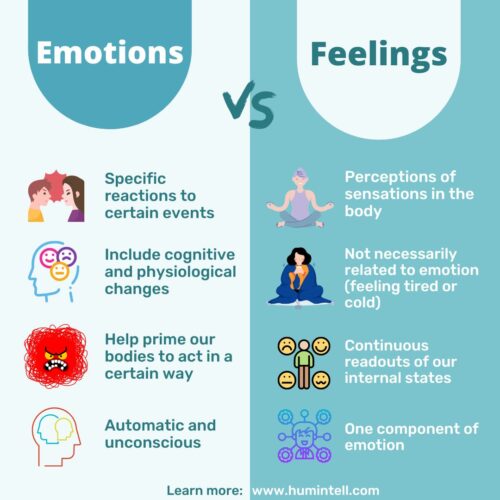
Image source: https://www.humintell.com/2022/05/whats-the-difference-between-emotions-and-feelings
As we navigate the complexities of human psychology, we encounter various superpowers hidden within our grasp. We have discussed during our previous months the superpowers of how we are investing our energy, self-care and how to control our thoughts. This month we are going to discuss, the ability to control our emotions stands out as a profound strength. Yet, on this April Fool’s Day, let’s embark on a journey of self-discovery that’s no joke: unraveling the nuances between emotions and feelings and harnessing the power of our emotional realm through Acceptance and Commitment Therapy (ACT) and Cognitive Behavioral Therapy (CBT) interventions.
Emotions vs. Feelings: Unveiling the Difference
The distinction between emotions and feelings, though subtle, is crucial. Emotions are raw, unfiltered responses to stimuli or situations—automatic, physiological reactions originating from our brain’s limbic system. Feelings, on the other hand, are our conscious experiences and interpretations of these emotions. While emotions are universal and shared across humanity, feelings are subjective, colored by personal experiences, beliefs, and memories.
Understanding this distinction reveals an empowering truth: while we might not have direct control over the automatic surge of emotions, we do have the power to influence our feelings—the narrative we construct about our emotional experience.
Harnessing ACT to Navigate Our Emotional Landscape
Acceptance and Commitment Therapy (ACT) offers a dynamic framework for dealing with our emotions and feelings. ACT emphasizes the importance of accepting our emotions as they are, without judgment. It encourages us to recognize that emotions, even those perceived as negative, are natural and transient aspects of the human experience.
One of the core processes of ACT, cognitive defusion, involves stepping back from our thoughts and feelings, observing them without getting entangled. This practice enables us to see that we are not our emotions; rather, they are passing events in the mind.
Another key component is values clarification. By identifying what truly matters to us, we can commit to actions aligned with our values, even in the face of uncomfortable emotions. This approach fosters a sense of purpose and direction, empowering us to navigate emotional challenges with grace and resilience.
CBT Interventions for Emotional Regulation
Cognitive Behavioral Therapy (CBT) complements ACT by offering practical strategies for modifying the thought patterns that influence our feelings. Two interventions particularly effective in the realm of emotional control are:
- Thought Challenging: This technique involves identifying negative, irrational thoughts that exacerbate unpleasant feelings and systematically questioning their validity. By replacing these thoughts with more balanced, realistic ones, we can alter our emotional responses.
- Behavioral Activation: Sometimes, our emotions can lead to withdrawal or avoidance behaviors. Behavioral activation encourages us to engage in activities that align with our interests and values, fostering positive emotions and reducing the impact of negative ones.
The True April Fool: Believing We’re Powerless Over Our Emotions
On this April Fool’s Day, let’s debunk the myth that we’re at the mercy of our emotions. While emotions themselves may be beyond our direct control, we hold significant power over our feelings and reactions. Through the application of ACT and CBT strategies, we can cultivate a more harmonious relationship with our emotional selves.
Learning to control our emotions—understanding them, accepting them, and ultimately guiding our feelings in a direction that serves us—embodies a superpower of immense value. It’s a journey of self-awareness, acceptance, and action that enables us to live more fully, authentically, and joyfully.
As we master this superpower, we find that the greatest April fool is the belief that we are helpless in the face of our emotions. Instead, we discover the truth: that within us lies the ability to navigate our emotional world with wisdom, compassion, and agency.



